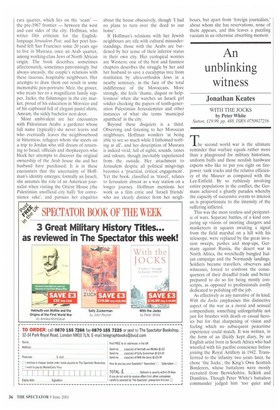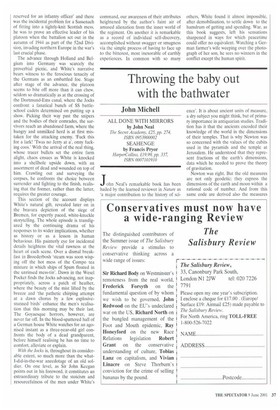An unblinking witness
Jonathan Keates
WITH THE JOCKS by Peter White
Sutton, £19.99, pp. 488, ISBN 0750927216
he second world war is the ultimate reminder that warfare equals rather more than a playground for military historians, uniform buffs and those nerdish hardware experts who like to put you right on firepower, tank tracks and the relative efficiency of the Mauser as compared with the Lee-Enfield. By so ruthlessly involving entire populations in the conflict, the Germans achieved a ghastly paradox whereby the capacity of successive events to interest us is proportionate to the intensity of the suffering inflicted.
This was the most restless and peripatetic of wars. Separate battles, of a kind conjuring up visions of snorting chargers and musketeers in squares awaiting a signal from the field marshal on a hill with his telescope, were replaced by the great invasion sweeps, pushes and mop-ups, Germany against Russia, the desert war in North Africa, the wretchedly bungled Italian campaign and the Normandy landings. Soldiers became travellers, observers and witnesses, forced to confront the consequences of their dreadful trade and better prepared to do so for being mostly conscripts, as opposed to professionals coolly dedicated to polishing off the job.
As effectively as any narrative of its kind, With the Jocks emphasises this distinctive aspect of the war as a moral and sensual compendium, something unforgettable not just for brushes with death or casual heroics but for that sharpening of vision and feeling which no subsequent peacetime experience could match. It was written, in the form of an illicitly kept diary, by an English artist born in South Africa who had wrestled with his pacifist conscience before joining the Royal Artillery in 1942. Transferrred to the infantry two years later, he chose 'the Jocks', the King's Own Scottish Borderers, whose battalions were mostly recruited from Berwickshire, Selkirk and Dumfries. Though Peter White's battalion commander judged him 'too quiet and
reserved for an infantry officer' and there was the incidental problem for a Sassenach of fitting into a tightly-knit Scottish mess, he was to prove an effective leader of his platoon when the battalion set out in the autumn of 1944 as part of the 52nd Division, invading northern Europe in the war's last crucial phase.
The advance through Holland and Belgium into Germany was scarcely the proverbial picnic, and White's narrative bears witness to the ferocious tenacity of the Germans as an embattled foe. Stage after stage of the advance, the platoon seems to bite off more than it can chew, seldom so dramatically as at the crossing of the Dortmund-Ems canal, where the Jocks confront a fanatical bunch of SS battleschool cadets determined on putting up a show. Picking their way past the snipers and the bodies of their comrades, the survivors reach an abandoned farm, where the hungry and unmilked herd is at first mistaken for the attacking enemy. 'Fuck this for a lark! 'Twas no Jerry at a', onny flicking coos.' With the arrival of the real thing, whose tracer bullets set the entire farm alight, chaos ensues as White is knocked into a shellhole upside down, with an assortment of dead and wounded on top of him. Crawling out and surveying the corpses, he confronts the choice between surrender and fighting to the finish, realising that the former, rather than the latter, requires the greater courage.
This section of the account displays White's natural gift, revealed later on in the bravura depiction of the siege of Bremen, for expertly paced, white-knuckle storytelling. The whole episode is transfigured by the continuing drama of his responses to its wider implications, whether as history or as a lesson in human behaviour. His painterly eye for incidental details heightens the vital rawness at the heart of each scene. Over a dismal breakfast in Broederbosh 'steam was soon wisping off the hot mess of the Compo tea mixture in which ships of Spam floated in the unrinsed mess-tin'. Dawn in the Wesel Pocket finds the Jocks advancing, not inappropriately, across a patch of heather, where the beauty of the mist lifted by the breeze and the pathetic chirping attempt at a dawn chorus by a few explosivestunned birds' enhance the men's realisation that this morning may be their last. The Goyaesque horrors, however, are never far off. In the blood-spattered hall of a German house White watches for an agonised instant as a three-year-old girl confronts the body of a dead grandparent, before himself realising he has no time to comfort, alleviate or explain.
With the Jocks is, throughout its considerable extent, so much more than the whatI-did-in-the-war anecdotage of an old soldier. On one level, as Sir John Keegan points out in his foreword, it constitutes an extraordinary tribute to the stoicism and resourcefulness of the men under White's
command, our awareness of their attributes heightened by the author's faint air of amused alienation from the inner world of the regiment. On another it is remarkable as a record of individual self-discovery, accomplished without swagger or smugness via the simple process of having to face up to the bitterest, most inexorable of earthly experiences. In common with so many others. White found it almost impossible, after demobilisation, to settle down to the humdrum of getting and spending. War, as this book suggests, left his sensations sharpened in ways for which peacetime could offer no equivalent. Watching a German farmer's wife weeping over the photograph of her son, he sees no winners in the conflict except the human spirit.



































































 Previous page
Previous page